Contemprary Tanka Poet Mariko Kitakubo.
お知らせ
|
|
On August 30, 2024, I attended Ms. Deborah P Kolodji's funeral and recited the Tan-Ku sequences and Tan-Ku sets that I had compiled with her, as well as the Tanka Sequences in memory of her, in Japanese and English. |
|
|
On August 30, 2024, At the ceremony after the funeral. I presented reading to many of the guests invited. |
Friday, August 30, 2024
|
|
On August 29, 2024, I attended the wake of Ms. Deborah P Kolodji, my soulmate and co-founder of Tan-Ku, and recited a tanka sequence in Japanese and English in her memory. |
|
|
At the wake of Ms. Deborah P Kolodji |
Thursday, August 29, 2024
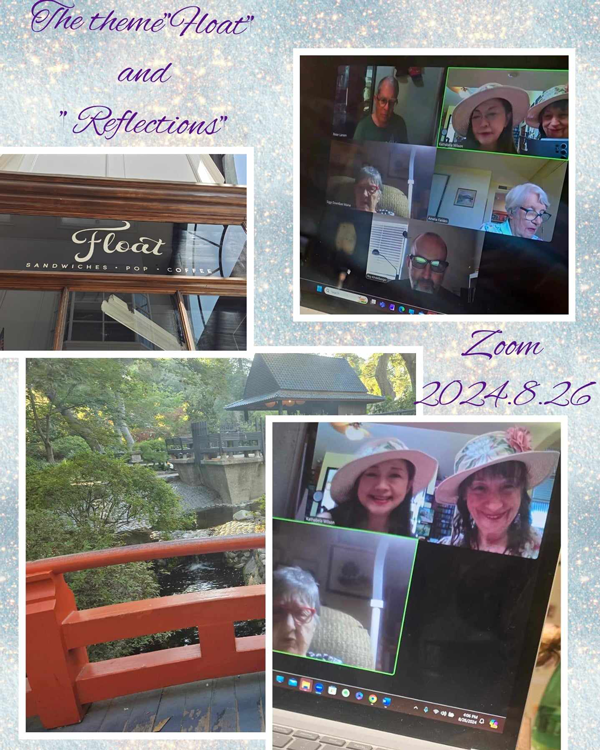 |
On Monday, August 26th, I participated in a Zoom Meeting and proposed two themes to the participants that day, "Float" and "Reflections," and recited my own tanka as examples. |
|
|
On Tuesday, August 27th, I participated in the Zoom Poetry Meeting hosted by Mr. Michael Czarnecki, the Shakuhachi Meeting with Mr. Rick Wilson, and the Cobalt Zoom Reading hosted by Mr. Rick Lupert, and recited a series of tanka sequence in memory of Ms. Deborah P Kolodji in Japanese and English. |
Tuesday, August 27, 2024
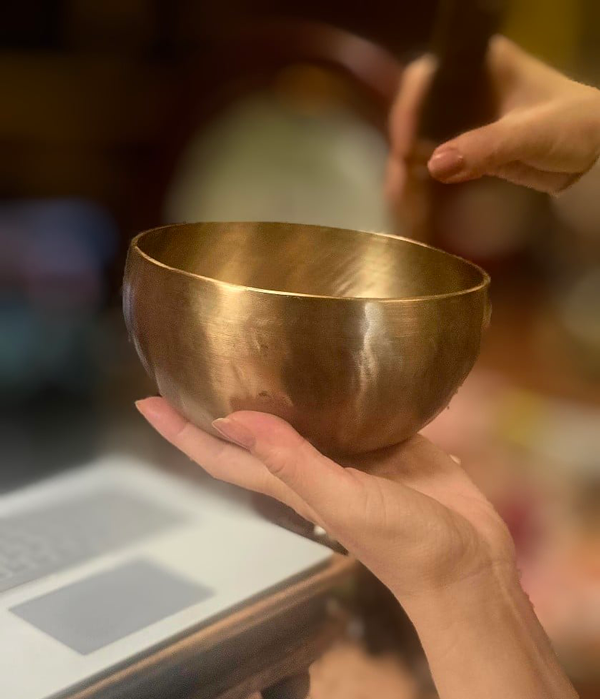 |
Aug. 24, I presented Japanese-English Tanka reading at Saturday ZOOM Meeting. |
Saturday, August 24, 2024
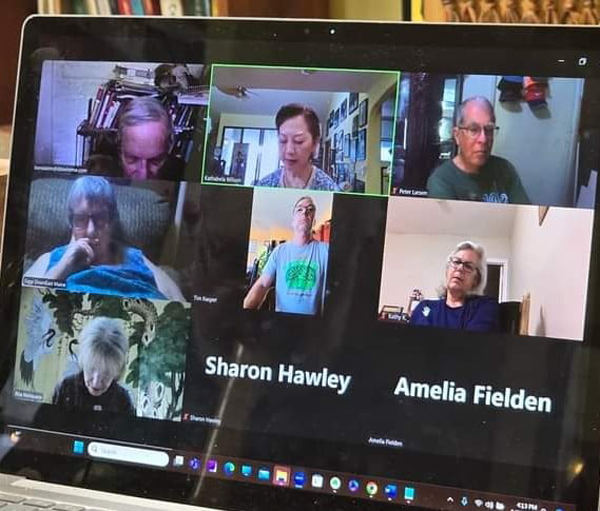 |
Aug. 23, I presented Japanese-English Tanka reading at Friday ZOOM Meeting. |
Friday, August 23, 2024
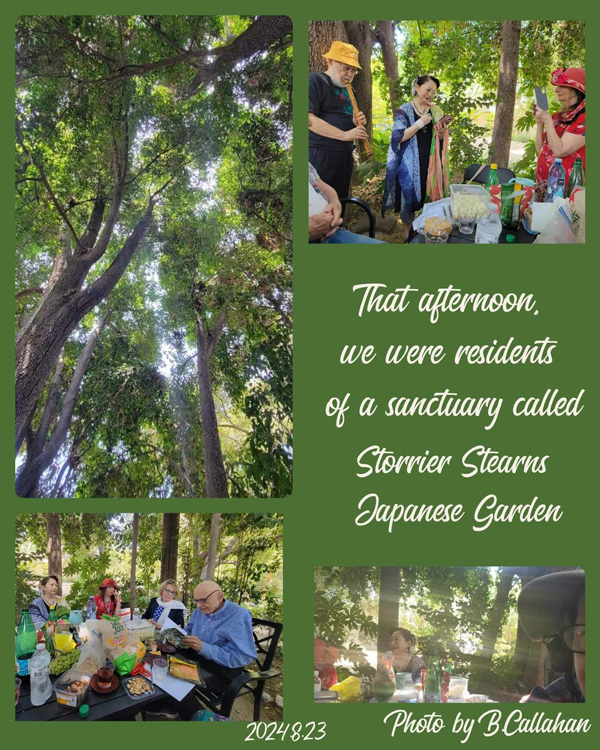 |
On August 23, I performed a Japanese-English Tanka reading at the Friday Poetry Meeting held at Storrier Stearns Japanese Garden. This was the 200th International Japanese-English Tanka reading (not including Zoom reading) that I started in 2005. I feel there is some deep meaning that this presentation in memory of my soulmate Debbie turned out to be such a special milestone. |
Friday, August 23, 2024
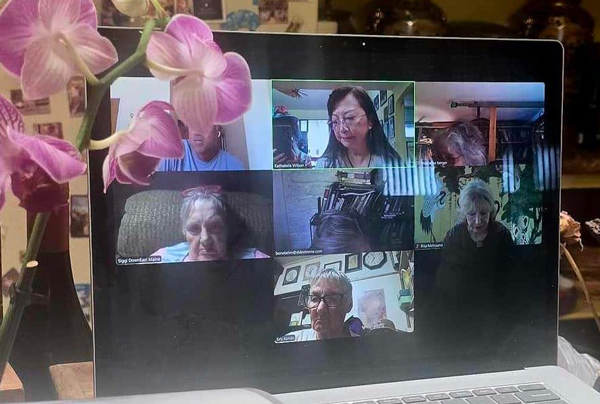 |
Aug. 22, I presented reading performance at Thursday Zoom Meeting hosted by Ms. Kathabela Wilson. |
Thursday, August 22, 2024
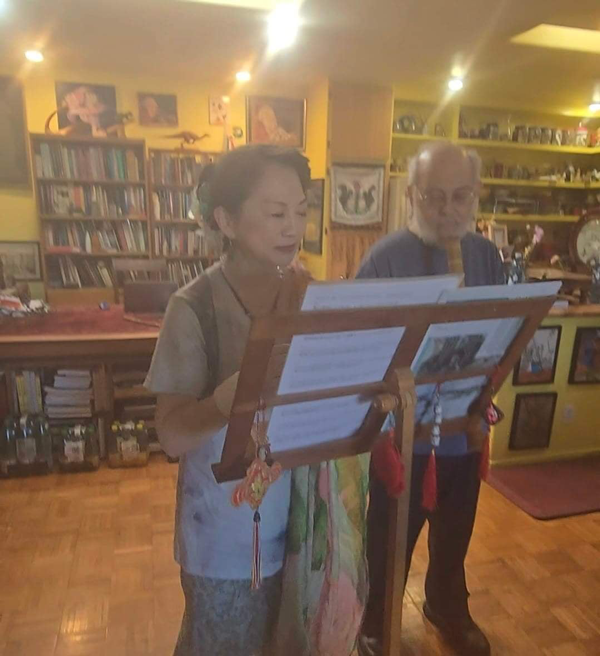 |
Aug. 22, 2024, I performed bilingual Tanka reading at the Thursday poetry Meeting hosted by Ms. Kathabela Wilson. |
Thursday, August 22, 2024
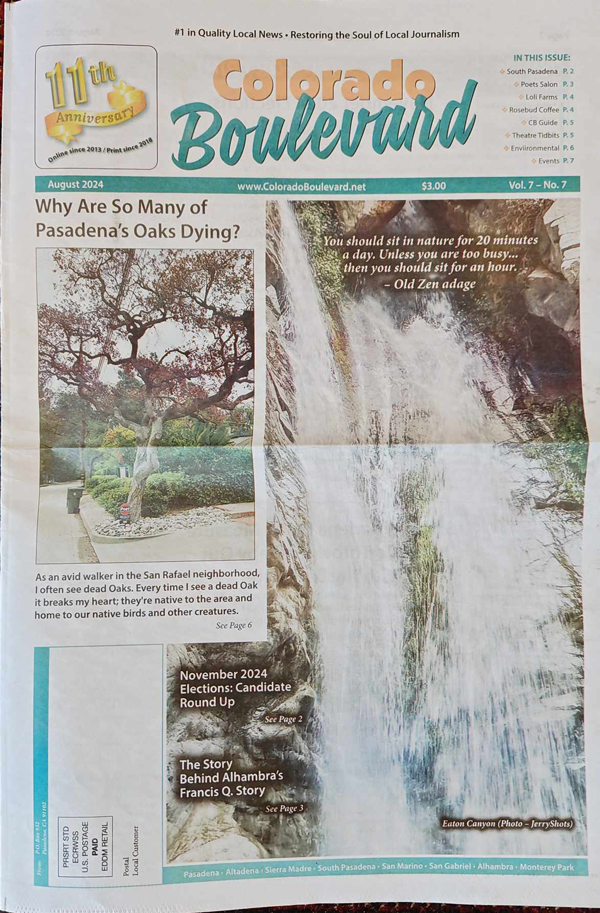

Poets Salon
Positive Energy
Hosted by Kathabela Wilson
Fireworks
longing
is always lonely sky...
under
the jacaranda
fireworks finale
Mariko
far away and yet...
the meteor shower
lights up the sky
-Deborah
(2024:31)
Tanabata
palm leaf sounds...
turquoise manicure
in midsummer
resting on the shore
bringing us closer
-Mariko
your thumb as you hang
the tanzaku
our matching wishes
-Deborah
(2024.714)
Mariko and Debbie
Mariko Kitakubo is a tanka poet in Tokyo, Japan.
Deborah P Kolodji wrote haiku in Temple Oty, CA.
Kathabela Wilson welcomes a short poem sent to : editorial@coloradoblvd.net
These are the last two new works written together by dear friends Marike Kitakubo and Deborah P Kolodji They created this form called Tan-Ku la combination of Tanka by Mariko and Haiku by Debbie) Distance is a a collection of their work together in 2023 by Shabda Press. Deborah's newest book, Vital Signs, Haiku glimpses of moments in her cancer journey was published in 2024 by Cuttlefish Books In Vital Signs, Deborah sees the condor come back from extinction as a metaphor for the cancer patient fighting for one's own survival.
Deborah P Kolodji passed away in her sleep on July 21, 20:24 after a long struggle with cancer. Her positive energy, beautiful writing and leadership in eur poetry world continues to inspire us all
Kathabela
Wednesday, August 21, 2024
Five works were posted in Under the Basho, including one piece by Tan-Ku as a preface.
Thank you very much to everyone at Under the Basho.
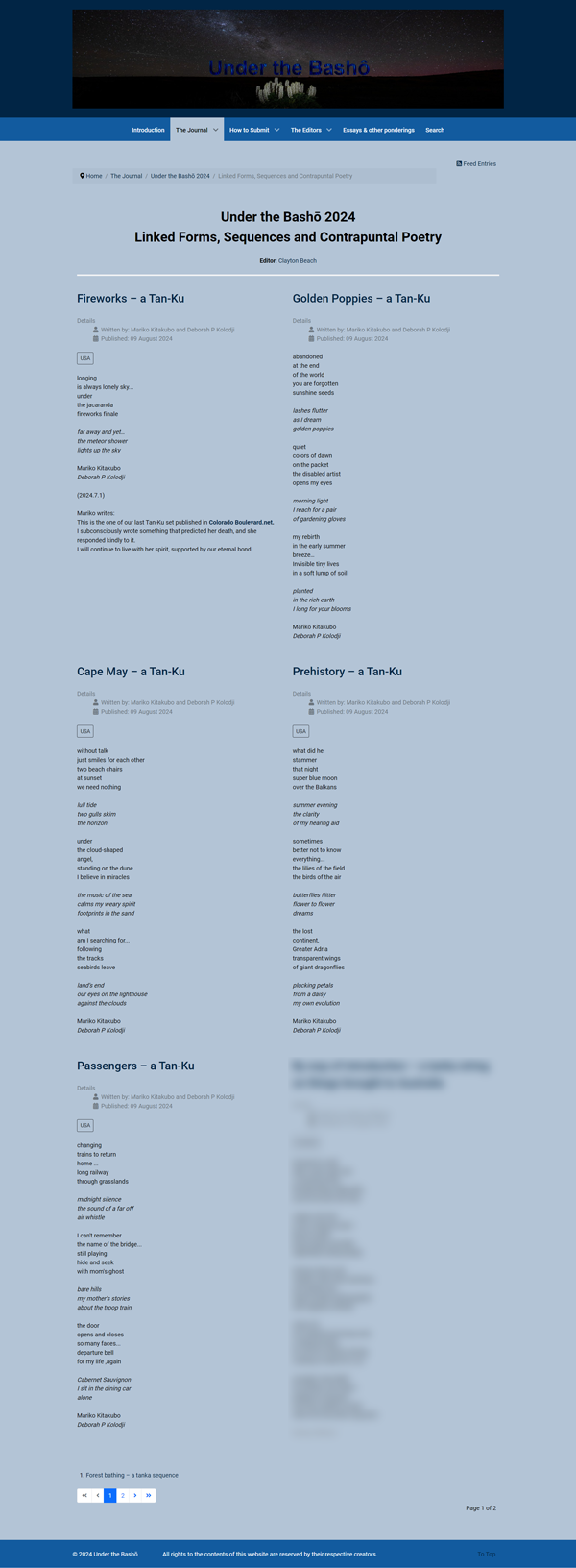
Fireworks – a Tan-Ku
Details
Written by: Mariko Kitakubo and Deborah P Kolodji
Published: 09 August 2024
longing
is always lonely sky...
under
the jacaranda
fireworks finale (M)
far away and yet…
the meteor shower
lights up the sky (D)
Mariko Kitakubo
Deborah P Kolodji
(2024.7.1)
Mariko writes:
This is the one of our last Tan-Ku set published in Colorado Boulevard.net.
I subconsciously wrote something that predicted her death, and she responded kindly to it.
I will continue to live with her spirit, supported by our eternal bond.
Golden Poppies – a Tan-Ku
Details
Written by: Mariko Kitakubo and Deborah P Kolodji
Published: 09 August 2024
abandoned
at the end
of the world
you are forgotten
sunshine seeds (M)
lashes flutter
as I dream
golden poppies (D)
quiet
colors of dawn
on the packet
the disabled artist
opens my eyes (M)
morning light
I reach for a pair
of gardening gloves (D)
my rebirth
in the early summer
breeze…
Invisible tiny lives
in a soft lump of soil (M)
planted
in the rich earth
I long for your blooms (D)
Mariko Kitakubo
Deborah P Kolodji
Cape May – a Tan-Ku
Details
Written by: Mariko Kitakubo and Deborah P Kolodji
Published: 09 August 2024
without talk
just smiles for each other
two beach chairs
at sunset
we need nothing (M)
lull tide
two gulls skim
the horizon (D)
under
the cloud-shaped
angel,
standing on the dune
I believe in miracles (M)
the music of the sea
calms my weary spirit
footprints in the sand (D)
what
am I searching for...
following
the tracks
seabirds leave (M)
land’s end
our eyes on the lighthouse
against the clouds (D)
Mariko Kitakubo
Deborah P Kolodji
Prehistory – a Tan-Ku
Details
Written by: Mariko Kitakubo and Deborah P Kolodji
Published: 09 August 2024
what did he
stammer
that night
super blue moon
over the Balkans (M)
summer evening
the clarity
of my hearing aid (D)
sometimes
better not to know
everything...
the lilies of the field
the birds of the air (M)
butterflies flitter
flower to flower
dreams (D)
the lost
continent,
Greater Adria
transparent wings
of giant dragonflies (M)
plucking petals
from a daisy
my own evolution (D)
Mariko Kitakubo
Deborah P Kolodji
Passengers – a Tan-Ku
Details
Written by: Mariko Kitakubo and Deborah P Kolodji
Published: 09 August 2024
changing
trains to return
home ...
long railway
through grasslands (M)
midnight silence
the sound of a far off
air whistle (D)
I can't remember
the name of the bridge...
still playing
hide and seek
with mom's ghost (M)
bare hills
my mother’s stories
about the troop train (D)
the door
opens and closes
so many faces...
departure bell
for my life ,again (M)
Cabernet Sauvignon
I sit in the dining car
alone (D)
Mariko Kitakubo
Deborah P Kolodji
Friday, August 9, 2024
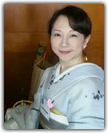
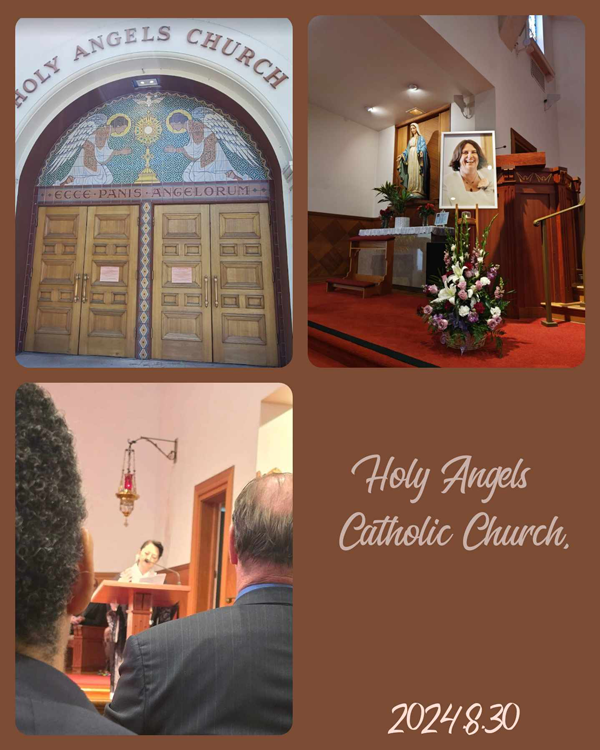
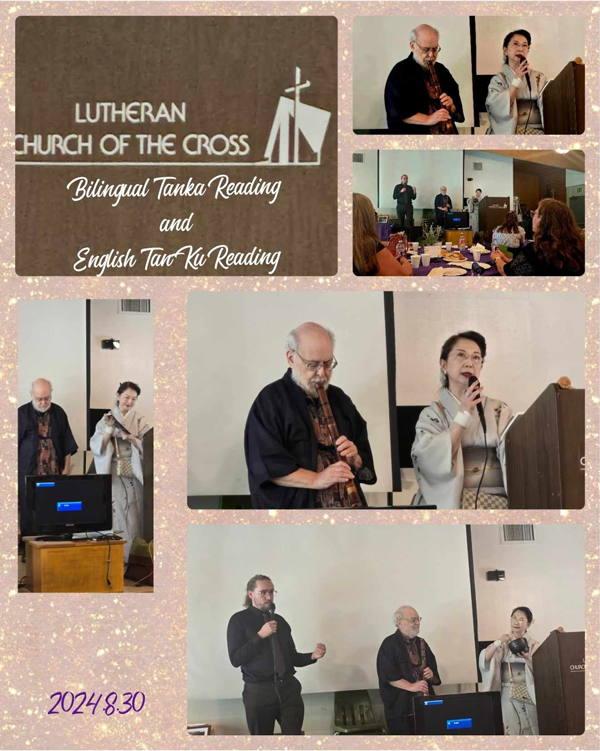
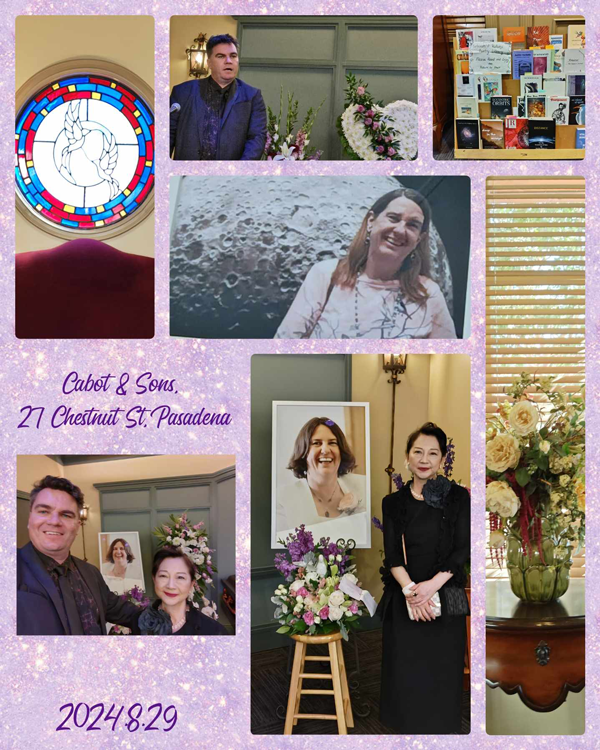
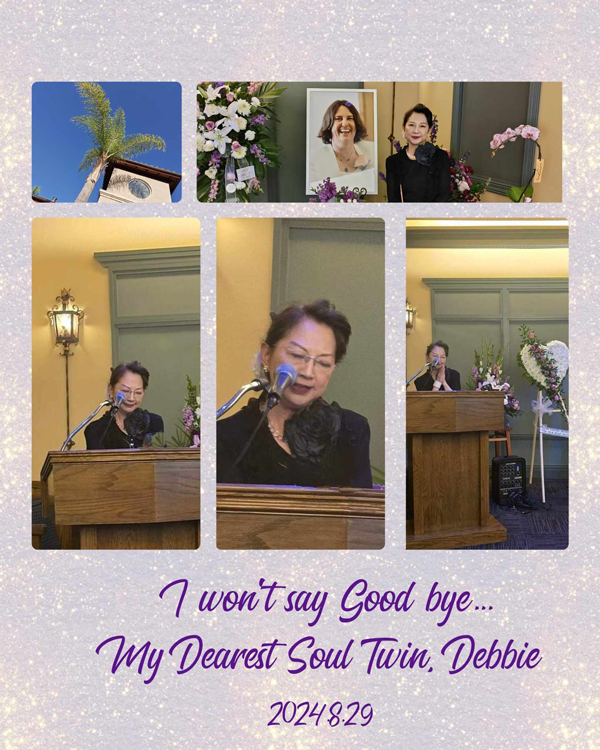
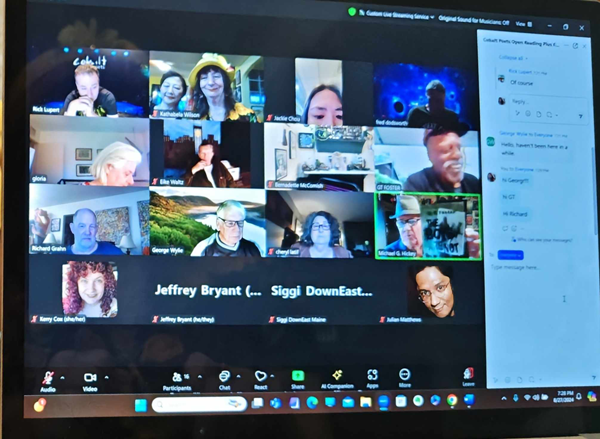
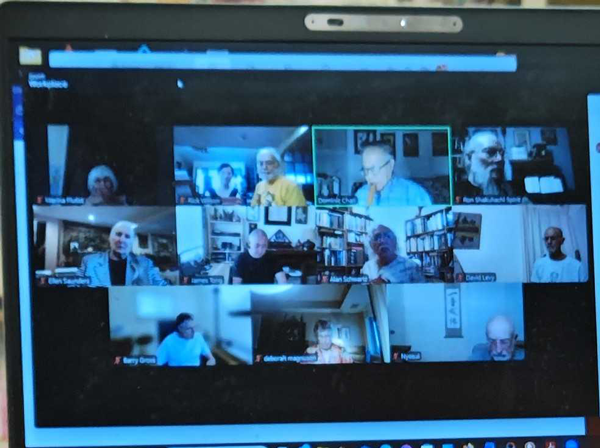
 Prev
Prev